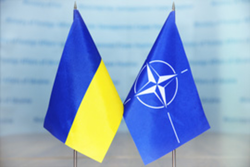November 25, 2014
A spokesman for Russian president Vladimir Putin told the BBC on Tuesday that Russia was nervous about NATO’s expansion towards its borders, and called for the West to make a “100% guarantee that no one would think about Ukraine joining NATO.” This may be the first time that the Russian government has stated explicitly what was widely believed to be the primary motivation behind Russia’s military annexation of Crimea earlier this year and its subsequent support for the armed separatist movement in the Russian-speaking eastern regions of Ukraine. This might present an opportunity for reaching an agreement to end the conflict in Ukraine, but the spokesman, Dmitri Peskov, did not appear to state it as such.

Photo Credit: NATO Press Center
Since Ukraine’s pro-Russian president Viktor Yanukovych was overthrown by the EuroMaidan protests in February, some Western diplomats and scholars have pointed to what is known as the “Finland option” as a path for Ukraine that would be acceptable to Russia, the U.S., and Europe. Finland, which became independent from Russia in 1917, is a member of the European Union, but has never joined NATO, and has extensive economic ties to both Russia and Europe. If Ukraine were to pursue a similar course, its association with Europe and eventual EU membership might not be seen by Russia as a threat, and Putin could be persuaded to accept an independent, territorially unified Ukraine.
U.S. and European officials have not publicly indicated any willingness to give Russia any guarantees about Ukraine’s future ties to NATO. They continue to accuse Russia of destabilizing Ukraine and violating the ceasefire in place in the eastern regions since September. On the same day as Peskov’s remarks, NATO’s Secretary-General Jens Stoltenberg said that Russia was again building up its military forces on the Ukrainian border, and possibly crossing into the separatist-controlled area. Germany’s foreign minister said there was still no end to the conflict in sight.
The longer the conflict continues, it will become more difficult for Ukraine to find a sustainable middle ground between Russia and the West. Russia’s other European neighbors, NATO members and non-members alike, have become increasingly concerned by Putin’s aggression in Ukraine and may respond by increasing their military cooperation with the West. The “Finland option” may not even be retained by Finland itself.
It is not clear whether Peskov’s comments indicate that Russia is willing to change its policy in Ukraine in exchange for a guarantee from NATO not to extend membership to Kiev. If so, a compromise solution would be within reach. For it to succeed however, Russia would have to fully accept Ukraine’s integration into the EU, even if it is out of NATO.
Scott Petiya is a 4LE student and Staff Editor for the Denver Journal of International Law and Policy

